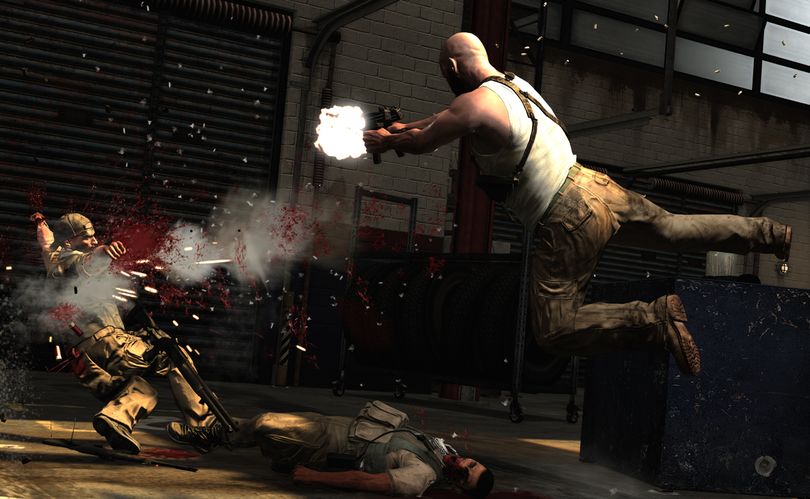A look back at Rockstar’s ‘Max Payne’ three-quel

Title: Max Payne 3
Genre: Third-person cover-based shooter
Platform Reviewed On: PC
Also Available For: Xbox 360, PlayStation 3, Mac
Developer: Rockstar Studios
Publisher: Rockstar Games
Release Date: May 15, 2012
In Max Payne 3, developer Rockstar crafted one of the strongest stories I've ever seen featured in a video game -- and they did so without any mind-blowing twists, galaxy-impacting choices, or other, typical features of acclaimed video game narratives. Instead, Rockstar focuses on a singular, gripping character study mixed with a violent tale of deceit and revenge. The result is a game that succeeds at telling a highly engaging, straightforward story while delivering enjoyable gameplay in spades. As far as linear, single-player gaming experiences go, Max Payne 3 is the complete package.

At the start of the game, we find our gruff, titular protagonist working contract security for Rodrigo Branco, the eldest brother of a wealthy Brazilian family, in the city of Sao Paulo. Not long after the game begins, Rodrigo's young wife, Fabiana, is kidnapped by a group of thugs, triggering a chain reaction of events that leads Max on a bloody quest through the glamorous high-rises and impoverished slums of Sao Palo as he seeks to get to the bottom of the attacks on the Branco family. The narrative periodically jumps back and forth between following Max's protective pursuits in the present, and chronicling how the ex-cop wound up thousands of miles from his hometown of New York to take up arms in defense of the Branco family. The talk-heavy narrative is dependent on frequent cutscenes to fuel its progression, but these breaks from the action are unobtrusive, masking loading screens and blending seamlessly with resuming gameplay.
The game's grimy visuals help to sell the desperation of the story and the sleaziness that pervades so much of the game's setting. A suite of diverse, flashy visual filters and on-screen text lends Max Payne 3 a unique style, and also helps to ensure that its elongated cutscenes are always dynamic and interesting.
A cast of highly memorable characters is on display, including perpetually-partying Branco brother Marcello, and Max's wise-cracking partner Passos. Strong performances ensure that all of the characters, even the caricatures, can be taken seriously. The true character standout, though, is Max Payne himself. Max is constantly narrating the proceedings. His commentary is blunt, amusing, and often unabashedly offensive, and the sheer volume of dialogue put out by the protagonist allows players to get inside his head to an extent that's rare for video game characters. For as well as players are bound to know Max by the game's conclusion, it's obvious that Max knows himself even better, as the man is constantly making smart, oftentimes sarcastic quips about his predicaments -- from his dependence on substances to his short fuse to his questionable tendency to perform acts of extreme violence. Little details like Max's changing hairstyles over the game's course as well as his realistic means of carrying his weapons help to enhance the believability of his character.

As a third-person cover-shooter, Max Payne 3 is among the best in the business. Its shooting mechanics are tight and weighty, and popping headshots is satisfying. A stellar, punchy soundtrack gets the blood pumping and keeps firefights tense. Cover usually functions as intended, though the system can be finicky and doesn't achieve the silky smoothness of genre leaders like Mass Effect and Gears of War. As a whole, Max feels heavier and less mobile than your typical action game protagonist, though this effect was likely intentional, as it adds to the feeling that Max isn't so much an action hero as he is a disgruntled, middle-aged man constantly on the brink of psychological collapse who's been pissed off one too many times. Furthermore, Rockstar balances its cover well, doing a good job of forcing players to stay mobile without constantly ushering them out of their positions.
Max Payne 3 is a refreshingly difficult game in an era where triple-A releases are increasingly easy on players. It's not brutal, but it demands an intelligent utilization of the resources at Max's disposal should players hope to survive. On top of the usual arsenal of assault rifles, pistols, and shotguns, those resources include Max's signature bullet time and shoot-dodge skills. I found myself rarely utilizing the latter after mastering the former, as Max Payne 3's level of difficulty makes staying put behind cover a more alluring option than bursting into firefights guns blazing. Bullet time and shoot-dodge are smoothly implemented and absolute joys to take advantage of; they are available for players to use at any time, and are also featured in a handful of bombastic, highly-entertaining set-piece moments.

The game's unflinching violence might feel overdone or outright gratuitous in the hands of a lesser developer, but Rockstar does a stellar job at ensuring that the brutality on display feels justified. This is an unquestionably mature story of greed, corruption, and the unsettling similarities between glamorous societal highs and the slums they tower over. Though the slow-motion kill-cams may not relate directly to Max Payne 3's thematic material, they are fitting additions in a game that's highly concerned with exploring the implications of extreme violence, both on society as a whole and on the individuals who commit such acts. Furthermore, Max's sardonic humor helps to alleviate the impact of the violence whilst lending it meaning and significance.
Many games today are concerned with vastness and bathed in convoluted narratives. Max Payne 3 concerns itself with neither of these qualities, telling a simple but expertly-crafted tale with razor-sharp focus and pitch black humor at every turn. Accompanying the fantastic story is a robust suite of third-person shooting mechanics, given added cinematic flare by the presence of bullet time, shoot-dodge, and myriad visual filters. It's stellar in almost every way it tries to be, proving that being better doesn't always require being bigger.
Score: 4.5/5 stars